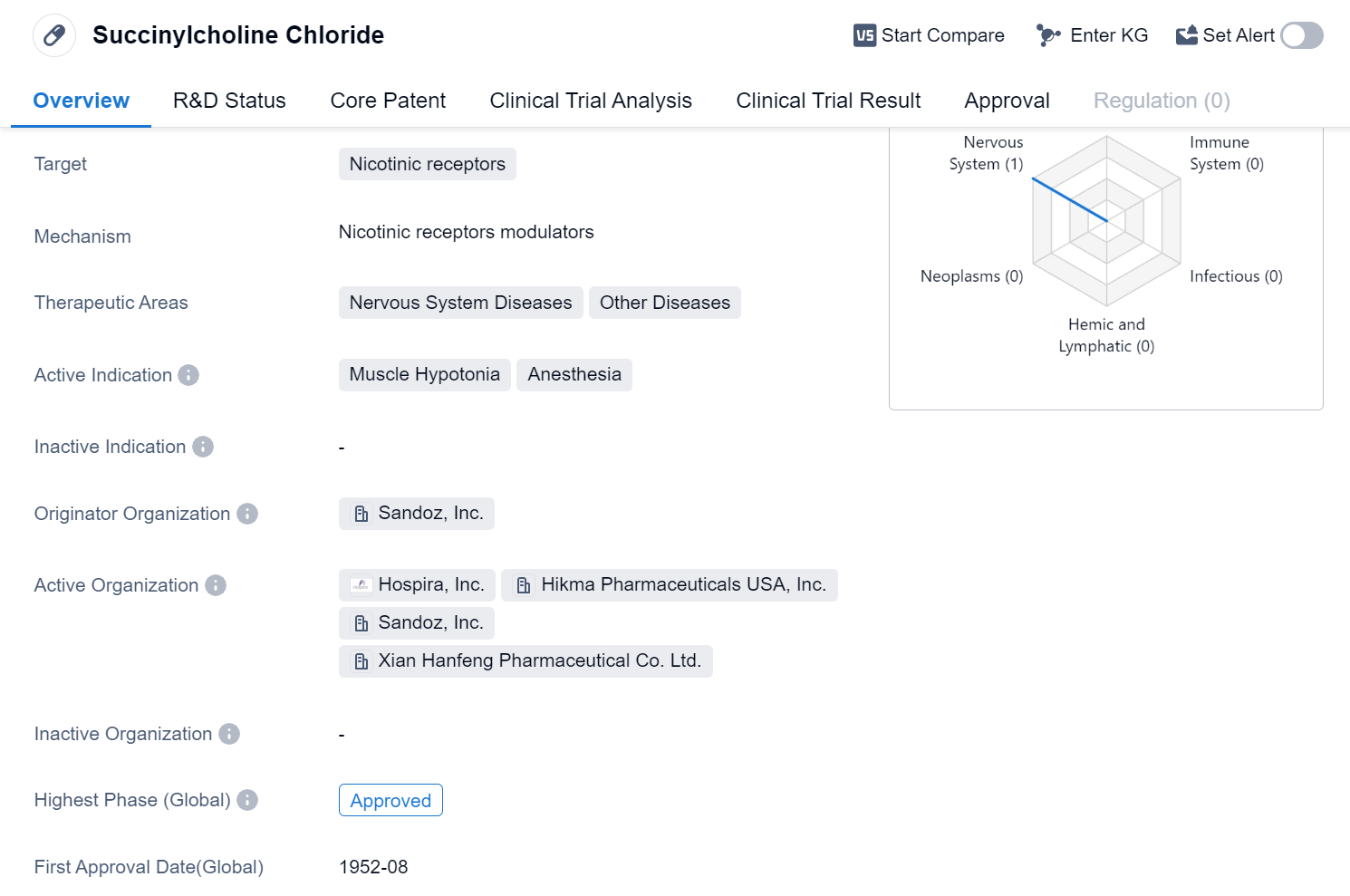Pharmaceutical Insights: Succinylcholine Chloride's R&D Progress
Succinylcholine Chloride's R&D Progress
Succinylcholine Chloride is a small molecule drug that targets nicotinic receptors. It is primarily used in the treatment of nervous system diseases and other diseases. The drug is specifically indicated for muscle hypotonia and anesthesia.
The originator organization of Succinylcholine Chloride is Sandoz, Inc. It is important to note that the drug has reached the highest phase of approval globally.
Succinylcholine Chloride was first approved for use in the United States in August 1952. This suggests that it has a long history of use and has been established as a reliable treatment option for the indicated conditions.
As a muscle relaxant, Succinylcholine Chloride works by blocking the transmission of nerve impulses to the muscles. This results in temporary paralysis, which is beneficial during surgical procedures or when muscle relaxation is required.
The drug's therapeutic areas, nervous system diseases, and other diseases, indicate its potential for a wide range of applications beyond muscle hypotonia and anesthesia. However, further research and clinical trials may be necessary to explore these potential uses.
👇Please click on the image below to directly access the latest data (R&D Status | Core Patent | Clinical Trial | Approval status in Global countries) of this drug.
Mechanism of Action for Succinylcholine Chloride: Nicotinic receptors modulators
Nicotinic receptors modulators are substances or drugs that interact with nicotinic receptors in the body. Nicotinic receptors are a type of neurotransmitter receptor found in the central nervous system and peripheral nervous system. They are named after nicotine because they can be activated by nicotine, as well as other substances like acetylcholine.
From a biomedical perspective, nicotinic receptors modulators can have various effects on the body's nervous system. They can either enhance or inhibit the activity of nicotinic receptors, leading to different physiological responses. These modulators can be used for therapeutic purposes in conditions such as Alzheimer's disease, schizophrenia, and nicotine addiction.
For example, in the case of Alzheimer's disease, certain nicotinic receptor modulators may be used to enhance the activity of these receptors, which can improve cognitive function and memory. In the context of nicotine addiction, specific modulators may be used to block the effects of nicotine on nicotinic receptors, reducing the rewarding effects of smoking and helping individuals quit smoking.
Overall, nicotinic receptor modulators play a crucial role in regulating the activity of nicotinic receptors and have potential therapeutic applications in various biomedical conditions.
Drug Target R&D Trends for Succinylcholine Chloride
According to Patsnap Synapse, as of 4 Sep 2023, there are a total of 170 Nicotinic receptors drugs worldwide, from 159 organizations, covering 91 indications, and conducting 1492 clinical trials.
Based on the analysis of the data provided, Pfizer Inc. is the company with the highest number of drugs under the target Nicotinic receptors, indicating their strong presence in this area. The indications with the highest number of approved drugs include Hyperemesis Gravidarum, Anesthesia, and Pain. Small molecule drugs are progressing rapidly, with potential competition from biosimilars. The United States is leading in the development of drugs for this target, followed by China and the European Union. China has shown progress with inactive drugs, suggesting future growth. Overall, the target Nicotinic receptors present a competitive landscape with diverse indications and drug types, indicating potential for future development and innovation in the pharmaceutical industry.
👇Please click on the picture link below for free registration or log in directly if you have a freemium account, you can browse the latest research progress on drugs, indications, organizations, clinical trials, clinical results, and drug patents related to this target
Conclusion
In conclusion, Succinylcholine Chloride is a small molecule drug that targets nicotinic receptors. It is primarily used for muscle hypotonia and anesthesia. The drug has been approved globally, with its first approval dating back to 1952 in the United States. As an expert in the pharmaceutical industry, it is important to consider the potential applications and benefits of Succinylcholine Chloride in the field of biomedicine.






